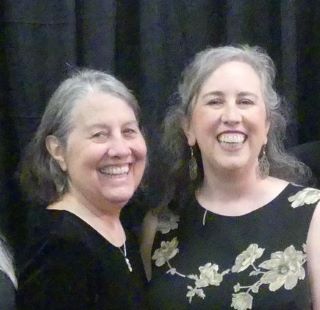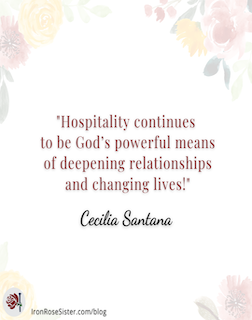-
A Commitment to Hospitality
 Introduced by Michelle J. Goff, then written by her mother, Jocelynn Goff, both in Arkansas
Introduced by Michelle J. Goff, then written by her mother, Jocelynn Goff, both in ArkansasMy mother has always modeled hospitality. Growing up, almost every Sunday we had someone over for lunch—people of different languages, cultures, and backgrounds. In honor of this week’s emphasis on commitment to one another as shown through hospitality, I can think of no better candidate to share one of her many stories. In her own words…
One Sunday many years ago in “early marriage days,” my husband came up to me after church saying, “See that man over there? I invited him for lunch.” “You did what?!” I asked incredulously as I looked at the man who had just walked into the church building that morning. He looked like he had slept in his ill-fitting suit. He had huge dandruff flakes all over the shoulders of his suit and in his eyebrows, in other words, a less than appealing presence of a man. I said, “He’s a stranger and we’ve got a baby to think about.” My husband replied, “I thought of that. That’s why I invited the preacher and his wife for lunch as well.” Again, my reply was, “You did what?!” I only have a one-pound meatloaf in the oven. We don’t have enough.” My husband gently said, “We have plenty. This man has $2.32 to his name and needs a bus ticket and ride to the bus station to get to his family. He came to the church for help.” Oh my! I was immediately humbled and changed my response to a prayer. “Dear Lord, please forgive my harsh, immediate judgment and please provide enough for us to share as You did with the small boy’s lunch of five loaves and two fish.” This was my prayer all the way home from church as I was also thinking of what else to add to the one-pound meatloaf.
When we arrived home, I got the meatloaf out of the oven and noticed that it had actually shrunk, not grown. “Oh my! Dear Lord, we still need a miracle multiplication here like You did with the small boy’s lunch.” I added to the meatloaf meal three cans of green beans, two boxes of macaroni and cheese, and a can of fruit cocktail with a sliced banana. Then I sliced the meatloaf and served the meal.
Everyone was served some of everything: meatloaf, macaroni and cheese, green beans, and fruit salad. We had pleasant conversation over lunch. The preacher and his wife agreed to take the man to the bus station and the church would pay for his bus ticket so he could go home to family.
After lunch when everyone had left, I cleared off the table and noticed the meatloaf. Do you know what? I had meatloaf left over! Everyone had been served, yet there was meatloaf left over. I remember in Mark’s account of the Feeding of the Five Thousand, “They all ate and were satisfied, and the disciples picked up twelve basketfuls of broken pieces of bread and fish” (Mk 6:42-43 NIV).
So, the next day as I ate a sandwich made with leftover meatloaf, I was again reminded of my prayer for God to multiply the meatloaf as He did with the loaves and fish and He did, and He gave me leftovers as a reminder of His abundant provision.
My reflection afterward was also on the scripture, Hebrews 13:2, “Do not forget to show hospitality to strangers, for by so doing some people have shown hospitality to angels without knowing it.” While I do not know if this man was an angel, I do know that every time I remember this event, it causes me to reflect on this verse and consider the real meaning of hospitality. We often think it’s opening our home to our family and friends. Actually, that is fellowship.
Fellowship is when connectedness or relationship is shared among those with a common aim or background. Hospitality is providing an act of service of welcoming, receiving, hosting, or entertaining guests or strangers. It’s an act of service, often to the least of these. In Matthew 25:40 Jesus says, “Truly I tell you, whatever you did for one of the least of these brothers and sisters of mine, you did for me.” As I’m sure you, like I, want to serve Jesus Himself then we must learn to serve the “least of these.” This provides the greatest blessing to them, to us, and is Kingdom living.
-
Broader Hospitality
 Written by Rianna Elmshaeuser, volunteer with Iron Rose Sister Ministries in Colorado
Written by Rianna Elmshaeuser, volunteer with Iron Rose Sister Ministries in ColoradoShare with the Lord’s people who are in need. Practice hospitality. (Ro 12:13 NIV)
Do not forget to show hospitality to strangers, for by so doing some people have shown hospitality to angels without knowing it. (Heb 13:2)
Offer hospitality to one another without grumbling. (1Pe 4:9)As a child, whenever I thought of hospitality, I would think of having people over for a nice meal, good conversation, and dessert. My parents did this often and I loved sitting and listening to the adults tell stories and laugh with each other. As an adult in a city with absurdly high housing prices, I cannot afford a home large enough to have more than one person over at a time. I do have a large backyard and on nice summer evenings, I can accommodate a larger group, but mostly I’m limited in this form of hospitality.
The good news for me is that there are other forms of hospitality and I think that is what the Bible is conveying more than merely having someone come to your house. Jesus did not have a home to invite people over for dinner either. In fact, he often needed a place to stay for himself and his followers, yet Jesus is the ultimate picture of hospitality. The Greek word used in Romans 12:13 for hospitality means “love of a stranger.” I know many people who open their homes and are excellent hosts for small group meetings, dinners, and game nights. In contrast, you may have been invited to the house of a person in which you did not feel welcome or comfortable. There are many reasons I have felt uncomfortable in a home, including it was so clean I was scared to step off the welcome mat, their spouse sat in their recliner the whole time smoking and playing Tetris (true story), no food or drink was offered, or the conversation was tense and awkward.
It is clear, from these scenarios, merely opening your home to others is not hospitality. Webster’s dictionary defines hospitality as “offering a pleasant or sustaining environment or being readily receptive.” There is much more to being hospitable than I initially thought. I have a friend who makes everyone who enters her home feel loved, safe, and comfortable. Her home is clean but not fancy. She welcomes you with a big smile and usually has it set up so you can help yourself to a snack or drink. There is an indescribable air of warmth and acceptance. A large part of the welcoming feeling in my friend’s home is her personality.
I may not be able to have gatherings at my home, but I can take the feeling of acceptance, warmth, and love with me wherever I go. Jesus had this same quality. For example, when a woman was thrown at his feet by a crowd demanding her brutal death, Jesus got down on her level. When the mob receded and it was just the two of them left, He spoke to her with love and forgiveness. Again, when He met a woman at a well with a long history of sin, He spoke with her, took the time to know her, and offered her more than she could ever dream; the living water of God’s love. Time and again, Jesus greeted the outcasts, degenerates, and poor with respect, love, and a spirit of hospitality. Hospitality is loving strangers like Jesus did; truly seeing them and being hospitable to their person.
Our church buildings are also places where great hospitality can be shown. How shameful if a visitor joins us as we worship God and feels unwelcome or unseen. The gathering of the church should be a place where the lost, hurting, discouraged, and faithful feel safe, feel loved, and feel welcome. In today’s society, Christians have a reputation as judgmental hypocrites. I used to find this offensive, but experience has taught me that this reputation is not wholly unmerited. In my experience, the central focus of too many sermons has been on sin and bringing sinners to repentance. I think a little more hospitality might go a long way towards bringing the lost to Jesus than a fiery sermon. After all, when Jesus spoke to the lost, He had great compassion and mercy. He reserved His harshest sermons for the religious leaders who were oppressing the people with their man-made laws rather than acting justly, loving mercy, and walking humbly with their God (Mic 6:8).
Sisters, let us be committed to showing hospitality, offering a pleasant or sustaining environment or being readily receptive, wherever we go.
-
Hospitality
 Written by Jocelynn Goff, volunteer with Iron Rose Sister Ministries and mother of Michelle J. Goff
Written by Jocelynn Goff, volunteer with Iron Rose Sister Ministries and mother of Michelle J. GoffOne Sunday many years ago in “early marriage days,” my husband came up to me after church saying, “See that man over there? I invited him for lunch.” “You did what?!” I asked incredulously as I looked at the man who had just walked into the church building that morning. He looked like he had slept in his ill-fitting suit. He had huge dandruff flakes all over the shoulders of his suit and in his eyebrows, in other words, a less than appealing presence of a man. I said, “He’s a stranger and we’ve got a baby to think about.” My husband replied, “I thought of that. That’s why I invited the preacher and his wife for lunch as well.” Again, my reply was, “You did what?!” I only have a one-pound meatloaf in the oven. We don’t have enough.” My husband gently said, “We have plenty. This man has $2.32 to his name and needs a bus ticket and ride to the bus station to get to his family. He came to the church for help.” Oh my! I was immediately humbled and changed my response to a prayer. “Dear Lord, please forgive my harsh, immediate judgment and please provide enough for us to share as You did with the small boy’s lunch of five loaves and two fish.” This was my prayer all the way home from church as I was also thinking of what else to add to the one-pound meatloaf.
When we arrived home, I got the meatloaf out of the oven and noticed that it had actually shrunk, not grown. “Oh my! Dear Lord, we still need a miracle multiplication here like You did with the small boy’s lunch.” I added to the meatloaf meal three cans of green beans, two boxes of macaroni and cheese, and a can of fruit cocktail with a sliced banana. Then I sliced the meatloaf and served the meal.
Everyone was served some of everything: meatloaf, macaroni and cheese, green beans, and fruit salad. We had pleasant conversation over lunch. The preacher and his wife agreed to take the man to the bus station and the church would pay for his bus ticket so he could go home to family.
After lunch and everyone had left, I cleared off the table and noticed the meatloaf. Do you know what? I had meatloaf left over! Everyone had been served, yet there was meatloaf left over. I remember in Mark’s account of the Feeding of the Five Thousand, “They all ate and were satisfied, and the disciples picked up twelve basketfuls of broken pieces of bread and fish” (Mark 6:42-43 NIV).
So, the next day as I ate a sandwich made with leftover meatloaf, I was again reminded of my prayer for God to multiply the meatloaf as He did with the loaves and fishes and He did, and He gave me leftovers as a reminder of His abundant provision.
My reflection afterward was also for the scripture, Hebrews 13:2, “Do not forget to entertain strangers, for by so doing some people have entertained angels without knowing it.” While I do not know if this man was an angel, I do know that this event and every time I remember it causes me to reflect on this verse and consider the real meaning of hospitality. We often think it’s opening our home to our family and friends. Actually, that is fellowship.
Fellowship is when connectedness or relationship is shared among those with a common aim or background. Hospitality is providing an act of service of welcoming, receiving, hosting, or entertaining guests or strangers. It’s an act of service often to the least of these. In Matthew 25:40 Jesus says, “I tell you the truth, whatever you did for one of the least of these brothers of Mine, you did for Me.” As I’m sure you, like I do, want to serve Jesus Himself then we must learn to serve the “least of these.” This provides the greatest blessing to them, to us, and is Kingdom living.
-
Hospitality Deepens Relationships
 Written by Cecília Santana, volunteer with Iron Rose Sister Ministries in Salvador, Brazil
Written by Cecília Santana, volunteer with Iron Rose Sister Ministries in Salvador, BrazilThroughout my Christian walk, I’ve understood that obeying God comes down to relationships. I can already hear you saying, “How so?” Hold on, I’ll explain! In Matthew 22:37-40 Jesus says to love first the Lord God with everything we have and to love our neighbor as we love ourselves. In practice, these two commandments mean that we need to be in relationship with God first (praying and meditating on the Bible) and this relationship will influence all of our other relationships.
We can only love who we know, and to know, we must spend time together. In Acts 2:44-46 we see that the first Christians regularly did things together. Sometimes in the current digital age, virtual friends get more attention than real friends. As Christians, we must be mindful to not neglect time with each other, especially post-pandemic where even church services became virtual, and the practice of hospitality is running the risk of being forgotten.
The Bible talks a lot about the importance of hospitality and today I want to cite two reasons to exercise this gift:
1 - God gave the first example for us to follow.
God wanted to be in relationship with us so He created a “perfect home.” The Garden of Eden had everything we needed and, most importantly, God walked with us there (Gen. 2:15-25). However, we know that this relationship was broken by the sin of Adam and Eve and they were forced to “leave home” as a result (Gen. 3:23,24). Soon after, God as a Loving Father brought about the renewing of His relationship with mankind through Noah when He told him to build a “safe house” free from evil, better known as Noah’s Ark (Gen. 6-9).
But again, disobedience distanced us until God once again restored our relationship, this time through Abraham, and the first step was to “leave home” (Gen. 12:1-3). This relationship was so deep that we see God revealing his plans for Abraham’s descendants. They would be guests in another country for a while (Gen. 15:13), but then they would have their own home; a land flowing with milk and honey (Gen. 15:18-19 and Deut. 6:3). Abraham was an exemplary host when he received the angels (Gen. 18:1-8), as was his nephew, Lot (Gen. 19:1-3). In both cases, these visits proved to be huge unexpected blessings!
The promise made to Abraham (Gen. 12:3) has reached all the way to us as daughters, by faith through our relationship with Christ who came down from Heaven to live on earth with us for 33 years (John 3:16) and continues to live in us through the Holy Spirit. The most beautiful part of this relationship is that Christ prepared our eternal dwelling (John 14:2-4), so we know that we are foreigners in this passing world and we cannot become attached to anything here. Everything is borrowed from God and should be used to bring others to Christ.
2 - Hospitality is an opportunity to exercise practical love.
Through our earthly home entrusted to us by Christ, some of us have the opportunity to show His love to the residents (parents, kids, spouse) who need a welcoming place, a “little piece of Heaven” in this dark world, where they can renew their physical, mental, emotional, and spiritual strength. Whether we share our home with others or live alone, this love should extend to neighbors, friends, brothers and sisters in Christ, and even to strangers! (Rom. 12:13; Gal. 6:10)
As wise women, we have the responsibility to maintain our homes (Prov. 14:1), be good managers and attentive to how everything is going like the “exemplary woman” of Proverbs 31. Our doors need to be open to teaching the Word as Lydia did (Acts 16:14,15, 40) so that Jesus can enter and transform lives as He did with Zacchaeus (Luke 19:1-10).
I am grateful to the woman who opened her home through which my husband and I came to Jesus and were converted more than 20 years ago. Therefore, my advice to those who think their homes are too small or too ugly is to let go of this idea because all guests need is for us to show them God’s love.
To conclude, I want to share three practical tips from the scriptures and my personal experience:
- Don’t complain! 1 Peter 4:9-11 tells us that we should practice hospitality without grumbling. I have had the opportunity to serve by helping with domestic tasks in homes where, even with problems, my merciful hosts were hospitable. I have also received guests who were challenging, and I learned to be more meek, patient, and self-controlled.
- Never expect anything in return! Everything we do is to glorify and honor God (1 Cor. 10:31). Our reward is eternal (Matt. 10:42). It is much better when the initiative to reciprocate is free and spontaneous, as it was with Elijah in 2 Kings 4:8-32. Be like the Shunammite woman— do your best and God will bless you— and if you are the guest, be a nice surprise!
- Finally: Rejoice, be generous and grateful for the opportunity to serve! Hospitality continues to be God’s powerful means of deepening relationships and changing lives!
-
If Lydia spoke today…
 Written by Michelle J. Goff, Director of Iron Rose Sister Ministries
Written by Michelle J. Goff, Director of Iron Rose Sister MinistriesI felt out of place when I first arrived. Everyone noticed my accent. Thankfully, my oddly red-stained hands from the madder root only served to promote my business.
It started out as a family business. My dad taught me as a child. His red-stained, weathered hands guided mine as he trained me in each step of the dying process.
My favorite part was growing and digging for madder root. It grew best in the moist ground near the river. And every time I went down to the river, I felt closer to God, our Creator, Yahweh, the one true God we worshipped.
I cried out to our God when father got sick. Yet, I had to trust in His plan when father was taken from us and I was left to run the family business. After months of caring for him in his illness, our business had suffered. And with the dip in production, we lost some of our clients. They did not know me as well as they knew father.
And as much as I tried, my father’s reputation was not enough. There was simply not enough business to go around and I was losing much of my profits in transport to other locations in order to obtain new clients.
Try as I might, I had to move to a more strategic location... maybe a more modern or developed Roman city where a female businesswoman would be respected for the quality of her dyes.
Thyatira, my hometown, located in Asia or modern-day Turkey. was not on a well-traversed trade route. However, Philippi was a coastal town, a Roman colony and the leading city in that district of Macedonia. The best part: I heard there was a river outside the city gates.
The river became my home away from home, a place of refuge, of prayer, and a blessed time gathering with other women.
I had been a worshipper of God for some time, but one day, down by the river, I listened to these men teach about Yahweh, the same God I worshipped and in whom I believed. I had never heard anyone speak of God in the way these men did.
As soon as I heard the good news, I had to tell everyone in my house all about this Jesus! Everyone believed along with me and we were all baptized that very day!
I invited Paul and Silas, these teachers and followers of Jesus, to stay in my home. They wanted to continue their journey, but when I offered them generous provisions and rest from their weary travels, they were convinced. The fact that they had already sampled my best chef’s excellent cooking did not hurt matters.
From that point on, my home had greater purpose. Receiving Paul and Silas after their escape from prison… And even the jailer, who was converted on the very night of their escape, and his entire family, became part of our church gatherings from that point forward.
As Paul later wrote us, I continue to rejoice in the way God guided my life to Philippi, in order to hear the good news, and be a proclaimer of that good news to those who buy my purple. I love to tell them about how my red-stained hands pale in comparison to the one who bore my stains on the cross.
For the full story of Lydia and the church In Philippi, read Acts 16. The monologue shared in this post was written as an illustration of how Lydia might have shared her story if she were with us today. We recognize the creative license that was used to create this entry and pray that it is not a distraction from the overall message of Lydia's faith and hospitality.
-
Welcoming
 Written by Kara Benson, volunteer with Iron Rose Sister Ministries in Arkansas
Written by Kara Benson, volunteer with Iron Rose Sister Ministries in ArkansasWhen I read through the lists of themes for the Iron Rose Sister Ministries articles for the new year, my eyes landed on the topic of “welcoming.” I knew exactly what God story I wanted to share.
My husband and I moved from Searcy to Little Rock in the summer of 2019. When we arrived at our new apartment complex, we were welcomed by over twenty members of the Lord’s church who showed up on that Saturday morning to help us move in. In less than thirty minutes, the brethren had unloaded the truck and moved everything into our new apartment. Lance and I were astonished. Here were people who sacrificed their Saturday morning to help us move in when they hadn’t even met us yet. Here were people who truly believed we were united through the bond of Christ. Here were people who loved us and welcomed us before they knew us.
In Matthew 25, the Son of Man comes in His glory and separates the sheep from the goats. To the sheep on His right, He invites them to come receive their heavenly inheritance: “For I was hungry and you gave me something to eat, I was thirsty and you gave me something to drink, I was a stranger and you invited me in, I needed clothes and you clothed me, I was sick and you looked after me, I was in prison and you came to visit me” (verses 35 and 36). Currently, my chosen secular job is in the hospitality industry. But for Christians, hospitality is a calling and a command. Hospitality is a spiritual work as much as it is a physical work. This unpaid labor of love is so much more important – eternally so.
Oftentimes, it seems we have a picture of a perfect home in our head – everything put away, everything cleaned, and all of the kids’ toys picked up. We feel like we must present perfection to anyone who walks through our front door. However, that is not real life. Sisters, I’m not saying it is wrong to want to clean your house before company comes over. But a problem arises when the lack of perfection prevents us from opening our homes to others. In Galatians 1:10, Paul writes that if he were still trying to please men, he would not be a servant of Christ. Are we trying to please people or are we more concerned with pleasing God? Let’s not let the world’s standards (everything looking perfect) become more important than God’s standards (practicing hospitality).
When Paul and Luke were shipwrecked on the coast of Malta, Publius (the chief official of the island) welcomed them into his home. Publius entertained Paul and Luke for three days even while “his father was sick in bed, suffering from fever and dysentery” (Acts 28:8). Even though he was enduring a struggle, even though his family member was sick, he prioritized showing hospitality. At times we may find ourselves weighed down by a busy schedule or simply uninterested in the inconvenience of hospitality. Despite difficult life circumstances, do we invite others into our homes, our lives, and our hearts?
In 1 Timothy 5:9-10, Paul instructs Timothy in the qualifications for a widow to be placed on the list of those financially supported by the church. Such a widow “is well known for her good deeds, such as… showing hospitality.” Romans 12:13 says, “Share with God’s people who are in need. Practice hospitality.” Are we practicing hospitality with our Christian family or only our friends and biological family?
Has someone ever done something nice for you and then ruined it by complaining about it? The apostle Peter writes, “Offer hospitality to one another without grumbling” (1 Peter 4:9). We can easily undo our good works by complaining about them. Sisters, I will share with you a time in which I failed. After returning from our honeymoon, we moved everything out of a storage unit and into our one-bedroom apartment. We were so blessed by the many wedding gifts and storage bins covering the floor that we couldn’t walk around the main room without stepping over packages and squeezing around stacks of boxes. Within our first week in our first apartment together, my husband invited over a family of five. Everything was shoved into the bedroom and the door was forced shut so we could have enough walking space and set up a folding table to make enough room for our guests. I was livid. How dare he inconvenience us so much in our new apartment? Wouldn’t there be time later for showing hospitality, when everything was cleaned and put away? Any good I did that day was negated by how much I complained before and after.
Hebrews 13:2 teaches, “Do not forget to show hospitality to strangers, for by so doing some people have entertained angels without knowing it.” Through these two personal stories I have shared and many others, God has taught me about the practice of filoxenía (“hospitality” in Greek). In Romans 16:23, Paul writes, “Gaius, whose hospitality I and the whole church here enjoy, sends you his greetings.” Among the Christians in Rome, Gaius was known for his hospitality. Let us be a people who are known for their hospitality.
See more photos on our Photo Gallery page.
(c) Iron Rose Sister Ministries. Site setup by Perfect Fit Web Design; Flag icons by Free Flag Icons

